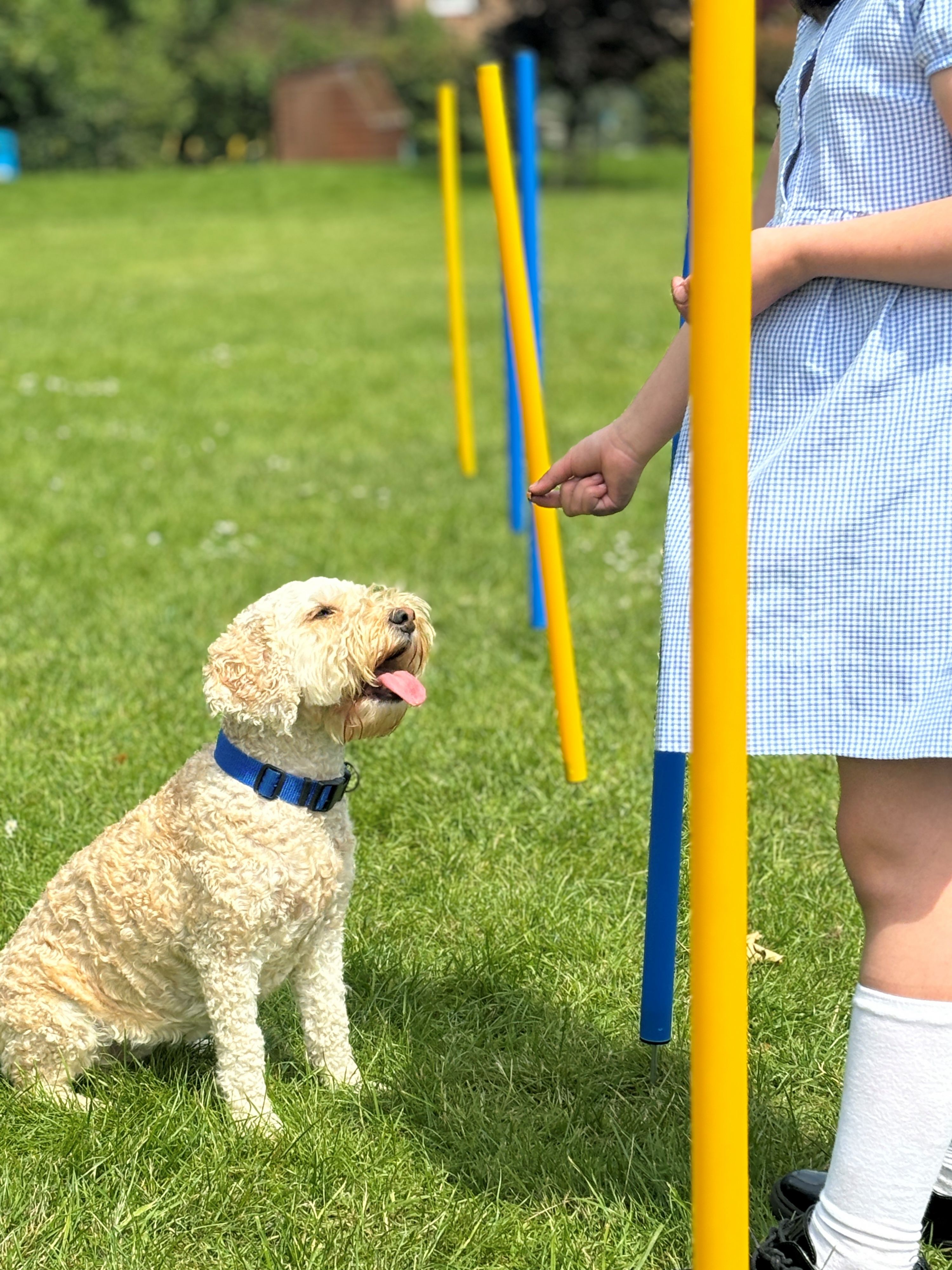Mental Health & Wellbeing
Thanks to the charity 'Essex Therapy Dogs' and their volunteers, we are fortunate to have two beautiful dogs visiting the school and the children. Ella and Luna visit the school weekly and work with the children in small groups.


The Benefits to Mental Health
- Help children to feel calm
- Provide comfort and help soothe emotions
- Lowering anxiety levels
- Reducing loneliness
- Bridging communication gaps. Everyone loves talking to their pets
- Decreasing feelings of depression
The Benefits to Physical Health
- Petting a dog can help people physically relax
- Reducing the risk of heart disease, heart attacks and stroke
- Improving cardiovascular health
- Slowing down breathing for those who are anxious
- Releases many mood boosting hormones oxytocin and dopamine which has the same effect as eating chocolate (but without the calories) and decreasing the stress hormone cortisol.
We know that our children feel safe and secure, they know that adults will listen to them and that they are valued. Building strong mental health early in life can help children build their self-esteem, learn to settle themselves and engage positively with their education. This, in turn, can lead to improved academic attainment, enhanced future employment opportunities and positive life choices. In line with local and national agendas, we aim to further develop our whole school approaches to Mental Health and Wellbeing thus providing opportunities for children, and the adults surrounding them, to develop their strengths and coping skills that underpin resilience. We are a school that can help our pupils (and staff) flourish and let their light shine.
Topic: The importance of Sleep
The lead-up and routine around your child’s bedtime is referred to as ’sleep hygiene’. Having good sleep hygiene can help your child both to settle to sleep and to stay asleep. There are several things that parents can do to help – here are some ideas of areas to consider. Children of different ages require different amounts of sleep.
| Your child’s age | Recommended sleep time in 24 hours |
|---|---|
| Children 3 to 5 years | 10 to 13 hours including naps |
| Children 6 to 12 years | 9 to 12 hours |
| Teenagers 13 to 18 years | 8 to 10 hours |
Things to think about,
Caffeine
Good sleep hygiene begins in the day, with the consideration of your child’s food and drink intake. Caffeine is a stimulant that prevents sleep, and can cause your child to stay awake for longer and to settle to sleep less easily. Caffeine is present in drinks such as tea, coffee, cola, energy drinks and fizzy pop. If your child drinks these, try to limit their intake and avoid them altogether after lunchtime.
Food
Eating a large meal before bedtime can prevent sleep. Consider the best time to eat your dinner meal – if your child has an early bedtime, ensure that a large meal is not being eaten directly beforehand. On school nights, it might be preferable for your child to eat earlier but you can still all have family meals at weekends and during holiday periods. However, some foods can be helpful in helping your child settle to sleep – for example, a drink of warm milk.
Exercise
Children may have difficulty in falling asleep if they have been inactive throughout the day. Encouraging your child, where possible, to undertake sports and to play outside can help to burn off energy and enable your child to feel tired at the end of the day. Even if your child is not very ‘sporty’, just going for a walk in the fresh air can be helpful. However, exercise should be avoided directly before bedtime, as the heat created by the muscles by exercise can prevent your child falling asleep.
Environment
Your child’s sleeping environment should be a place where they feel safe and secure, but should also be a place to sleep and not play. There are several ways in which the sleeping environment can be adjusted, but it will depend on the needs of your child (and any other children sharing the room).
For instance, some children may find the use of a nightlight can make them feel safe – others may sleep better in total darkness. Room temperature and noise level should be adjusted, where possible, to ensure your child is comfortable to fall asleep.
Your child’s bedroom should not contain things that distract them from sleeping – if you find that your child is being stimulated by toys, it may be best to remove these from the room before bedtime, or to keep toys in a different area of the house.
Routine
Having a bedtime routine and a set bedtime can help your child to understand what to expect and how they should behave. A routine can start 30 minutes to two hours before bedtime, and can include activities to help wind down, such as a warm bath/shower or reading a story.
Sticking to a set pattern each night will help your child to settle before bed and give them the time to calm down before sleeping. Going to the toilet as the last task before getting into bed can also help prevent your child from needing to get up in the night time.
Technology
The use of electronic devices (such as televisions, mobile phones and tablet computers) close to bedtime can prevent your child from settling to sleep. This is because they produce light that is good at suppressing natural hormones in the brain that cause sleepiness.
Ideally, these devices should not be used in the hours before bed, and should be removed from your child’s bedroom in order to create an environment that your child associates with sleep.
If your child uses these devices to help them fall asleep, consider replacing this routine with a bedtime story or playing soothing music.
Self-settling
If your child is routinely waking in the night, it is important that they learn to self-settle rather than seeking a parent or joining a parent’s bed. This can be difficult to enforce, and may be emotionally challenging – both for child and parent – but parents should remain firm and assertive.
If your child leaves their bed and seeks you out at night-time, you should try not to engage them in conversation, but lead them quietly and immediately back to bed. This may need to be repeated several times each night, but it is important that your child learns that they will receive the same response from you each time.
If your child is anxious, the use of a night light, cuddly toy or baby monitor may help them to feel safe and to learn to self-settle.
Praising your child in the morning for staying in bed at night can help reinforce good behaviour – this can be aided by the use of a reward chart or stickers, with a small token prize when a certain number of stickers/rewards have been won.
Below is a useful webinar regarding the importance of sleep;
Some useful local websites regarding Wellbeing and Mental health:
